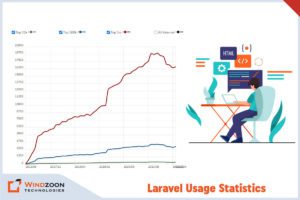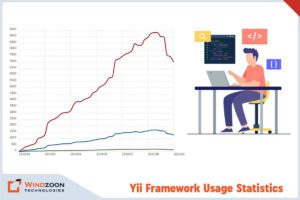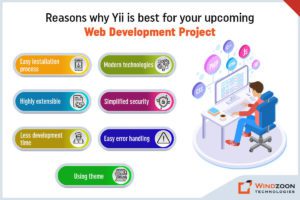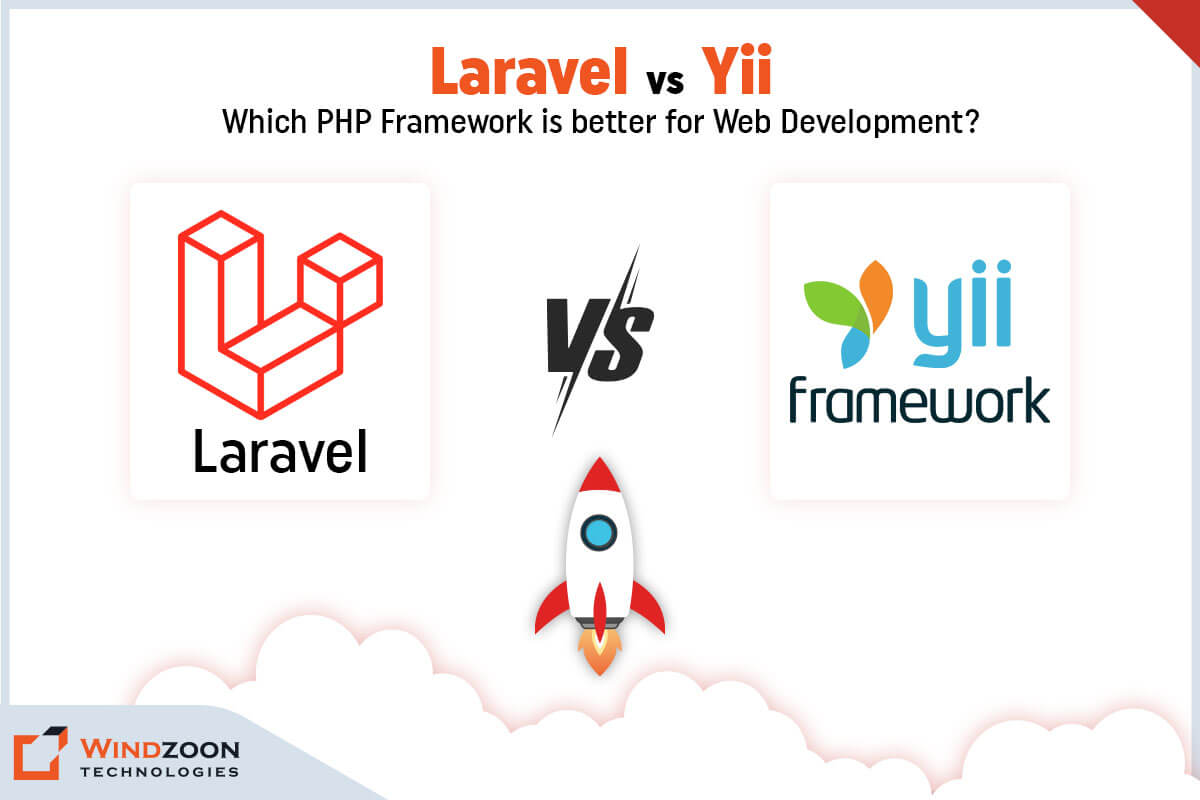Have you ever thought about the digital industry without frameworks? It’s like imagining life without oxygen!
While developing a new app, there are chances that your work gets complex. Ultimately, it reaches the end where just retaining libraries is not enough.
A design, layout, and structure are required in the chaos of codes.
This is when Frameworks comes to the rescue. If you think these frameworks are not your cup of tea, then you can also connect to Laravel Development Company & Yii Development Company for the best assistance.
But now, without any further ado let’s jump to the agenda of this blog!
What is a Framework & its Type?
A software framework is a portal that provides a base for designing or developing applications.
It is a working program that can be customized or modified by coding. It operates on shared resources like the library and places them jointly in one package. This package can be revised to serve the specific requirements of any project. With the use of a framework, developers can modify segments to give unique functionality to the app.
Types of frameworks are popularly divided into three:
1. Back-End Web Frameworks
2. Front-End Web Frameworks
3. Mobile Development Frameworks
Back-End Web Frameworks
It is the most commonly operated programming framework.
These frameworks entirely transform the way web development is done. Rather than constructing websites operating HTML, JavaScript & CSS, back-end frameworks operate programming languages to connect with a database to render content.
Front-End Web Frameworks
Unlike back-end, front-end frameworks are enforced in a user’s browser.
They enable developers to develop what the users witness on the website. It gives web developers a platform to design & gives them power over what the outcome looks like.
Mobile Development Frameworks
With the advancement of mobile rapidly attaining interest, this framework witnesses an equally remarkable uptick. Like their desktop replicas, mobile development frameworks offer designers a system that helps the mobile app-building procedure.
Through this research & survey, you can easily judge which framework is popular. In this blog, we will be covering a very heated & popular topic about two frameworks Laravel & Yii!
What is Laravel?
Laravel is open-source with a strong and feasible PHP framework.
Laravel reutilizes the existent features of various frameworks which assists in building a web application. It helps design apps in a more structured and practical way.

Laravel Usage Statistics
Laravel has now been accepted globally & the usage of laravel is growing rapidly!
It delivers a rich set of functionalities that includes the essential features of the framework. These features help boost the speed of the whole web app development process. If you are planning to build a website straight from the scratch, then it saves a lot of time. Also for the best hassle-free development, you can avail of Laravel Development Service in India. Moreover, a website constructed in Laravel is protected and controls bugs entering the website.
What is Yii?
The pronunciation of “Yii” is “Yee”, which is derived from a Chinese word that means “simple and evolutionary”. It is appropriate for projects of every size as it highly optimizes performance.

Yii Framework Usage Statistics
Yii is an open-source, PHP-based lightweight framework utilized to design an entire application more quickly. As per statistics, Yii framework usage is growing as it is appropriate for designing Web 2.0 apps. It rapidify the web development process. It comprises a code generator named Gii, which composes the code for you & also saves you time. You can easily Hire Yii Developer for the best assistance. But now, first, understand the difference between Yii & Yii2.
Difference between Yii & Yii2
Since its launch in 2008, Yii has constantly shown progress after numerous years of intensive outcomes with every version. As this framework is absolutely performance-optimized, it is an ideal pick for a task of any size.
The release of Yii 2, in July 2014 with its beta version initiated a wave of enthusiasm about its characteristics and advantages. While comparing Yii2 and Yii1 we will jot down multiple aspects of progress that will answer all the queries about both versions.
1. PHP
Yii1 code can be deplored, modified, and replaced whereas, Yii2 code needs a complete migration.
If you like to migrate from Yii1 to Yii2, unfortunately, you have to completely migrate your whole code.
Conceptually, both versions are quite similar, however, Yii2 drives on newer PHP versions and uses namespaces, attributes, etc.
2. Console Application
In Yii1 console apps are composed of controllers, just like web applications!
Whereas, in Yii2, to run console control Yii1 is utilized where the controller route is.
3. Query Builder
Query builder is spread among various categories in the Yii1.
Whereas, compared to the Yii2 where the database query is represented as an object!
4. Controllers
In Yii1 the controller class for action categories is [[yii\base\Action]], whereas Yii2 utilizes [[yii\web\Controller]] as a base controller category.
Other than these 4 differences, there are a few more Yii1 & Yii2 differences from Basic to Advanced. Yii overall is effortless to install, uses modern technologies, is admiringly expandable, facilitates safety, provides adequate performance, and lessens the development time.
Reasons why Laravel is best for your Next Web Development Project

Reasons why Laravel is best for your Next Web Development Project
The IT industry is fully filled with the best Laravel development firms that deliver amazing assistance and also have a team of skillful Laravel developers. So below are seven reasons why laravel is a good option to choose!
1. Model-View-Controller support & Object-Oriented Approach
MVC i.e Model, View, & Controller is a design in software that is commonly used to execute data & user interfaces.
The foremost and amazing benefit of the Laravel framework is that it heeds – MVC-based architectural design & it has an explicitly attractive syntax that drives it object-oriented.
2. Built-In Authentication
Laravel framework caters to out-of-the-box formatting for a more authenticated design. Merely in a few artisan orders, your app will be set with protected Authentication and Authorization.
3. Packaging System
A packaging system deals with numerous libraries that allow the web app to automate the procedure. This framework utilizes a composer that composes all the data required to manage the package.
Picture, Laravel Debug section, & Laravel integrated development environment (IDE) assistant is the best Laravel package.
4. Multiple File System
Laravel framework has in-built support for the cloud system for local storage as well. It’s exceptionally easy to switch between these cloud storage options as the Application programming interface stays the same for every system.
5. Templating engine
This framework comes with an in-built template named Blade Template. Blade templating incorporates multiple templates with an information model to make views. By transpiring the templates into PHP code the performance also improves. Blade also delivers a collection of its control structures like conditional statements, that are internally mapped to their PHP look-alikes.
6. Scheduling Tasks
The scheduler was launched in Laravel 5.0, it is an expansion to the Artisan command that enables programmatic scheduling of periodic managed tasks. Internally, the scheduler depends on the cron daemon to execute a single Artisan task that executes all the configured tasks.
7. Testing
For the testing of an app, Laravel itself by default offers the unit test for the app. This itself includes tests that witness and control reversals in the framework. With the integration of PHP, the testing framework has become very easy in the Laravel-built app.
Apart from the above-discussed characteristics, the Laravel framework also has official packages that are convenient when incorporating additional features in the app.
Reasons why Yii is best for your Upcoming Web Development Project

Reasons why Yii is best for your Upcoming Web Development Project
1. Easy Installation Process
For each developer, time is very precious.
Thus, it is significant to handle a framework whose installation process is easy & less time-consuming. However, it will cost only the designers valuable time that they need to execute & build a web or app.
It is because of a not-so-complicated, effortless installation and structure process that comes with the Yii.
2. Modern Technologies
Yii framework utilizes an Object-oriented programming framework and takes advantage of PHP’s cutting-edge features. This comprises the modern static binding and System Programming Language classes function.
3. Highly Extensible
The ability to be customized & tailored to fit all your requirements is what makes Yii framework so popular & approachable.
Each & every feature & segment of this stunning framework is virtually extensible.
4. Simplified Security
Appropriate security is important for every application & this is where Yii can assist you. Yii framework has a security feature element that discloses various approaches to assist in building a more safe & secure app.
5. Less Development Time
Yii framework allows you to spend a shorter time completing your task so that you get more time to customize your app as per your suitable needs.
For the same purpose, Gii is the tool that comes into action. It is a code that is a web-based structured tool that enables you to swiftly form codes.
It also assists you with the templates for models, controllers, modules, & extensions.
6. Easy Error Handling
Yii is a comprehensive error-handling framework. It is based on PHP5’s exceptional mechanism. When any sort of unnoticeable happens during app execution, the error handlers will control and begin the required error-controlling procedure.
7. Using Theme
Themes are a fantastic way of systematically personalizing the layout of web pages. The appearance of an app or website can be greatly enriched with an appropriate & attractive theme.
In the Yii framework, every theme has a guidebook consisting of design files, JavaScript, and CSS files. It also has additional applicable resource files containing pictures, view files, & more.
Each theme is available under the same guidebook WebRoot/themes and only one theme can be created at a time.
Comparison between Laravel vs Yii
Both frameworks have their own pros and cons. However, both of these fantastic frameworks are great to be integrated with PHP.
Below are seven basic comparisons between the two, that will make your decision of choice easier!

Difference between Laravel and Yii Framework
1. Project setup
When judging Laravel & Yii, on the basis of their project setup. Even though both comprise a simple installation process, Yii stands a bit ahead of Laravel.
With Yii, all you have to do is download the framework & run the application. You get a swift & thriving installation without any difficulties. It has an isolated front-end & back-end, which can be used for creating the admin space and a user-friendly site.
Whereas installation of Laravel can be done by two methods. Either utilizing composer (a PHP package manager) or Laravel Installer. This framework comes with an easy help that fastens the installation with a command-line mechanism.
2. Form Validation
As compared to Laravel, form validation of Yii consumes more time.
Laravel has a unique validator that allows developers to execute form validation anytime anywhere. For convenience purposes, we can expand the Elevated class by utilizing personalized methods. One con of it is that we have to tailor the code to define attributes with properties derived from numerous systems.
Yii holds a special platform for form verification. We can fix the rules and validate if the data is received directly in ActiveRecord. The entire mechanism functions well but we have to examine the controllers directly, that is something the Laravel framework delivers with its validator itself.
3. Extensions
Any disadvantage of a framework can easily become its advantage with the use of the extension’s support. Both frameworks have a group of amazing extensions.
Laravel contains multiple extension attributes to customize the features or replace them entirely.
Likewise, the Yii framework formed a big number of extensions that deliver an abundance of useful functionalities. These extensions are very easy and convenient for both naive and experienced developers.
4. Security
Safety & Security is a significant aspect to consider while exploring frameworks. Laravel & Yii both contain tools for password security, two-factor authentication, security from Cross-Site Scripting, Structured Query Language injections, etc.
The unique safety features in Yii contain Role-based entry control. It has a feature-rich entry control filter like OpenID, OAuth 2, etc.
Whereas, Laravel contains safety attributes like Access Control List plugins, and entry control filters.
Laravel framework lacks shelf entry control tools.
It doesn’t indicate that Laravel is not appropriate in terms of safety components.
5. Migration
Laravel & Yii, both contain incredible migration mechanisms allowing designers to manage their working procedures in a smooth & suitable way.
Laravel lets them add seeders that allow swift and simple transfer of information. This attribute gives amazing help for testing and refilling static guidebooks.
On the other hand, Yii designers have the only option to do this via migrations.
6. Routing
With the Laravel framework, the user is required to display a path to each step of the controller. Laravel considers that the framework must provide a default routing.
Whereas with Yii, easy routing is feasible as a route for each step is not required. All route movements are picked up by default.
7. Crud Generation
There is a CRUD (Create, Read, Update, Delete) for the admin panel for diverse tables.
In Laravel, there is no support that is default available for this activity.
Whereas in Yii, there is a separate dedicated mechanism known as “Gii”, that delivers a web-based interface where codes are generated interactively.
Conclusion
Laravel vs Yii, which one to choose?
It entirely relies on the needs of the client & developer.
Both frameworks have their own share of pros and cons.
Where Yii delivers elevated security and quicker performance, Laravel delivers an explicit syntax framework.
Hence in this debate of Laravel vs Yii — it’s the developer’s preference to determine between both of these.
If you are scrutinizing a framework to construct a large-scale web app, the Laravel framework is the perfect selection you can make.
And in case you desire to construct simple small-to-medium-grade apps, then Yii can be our preferred option for you.
Our extremely skillful team of developers is always up to assist you & deliver your specifications. You can Hire Laravel Developer or avail yourself of our best Yii Development Service for the best & professional web or app development!
We deliver Custom-Built Mobile applications & Web Solutions. To avail of our services connect us at [email protected] to get a quote or know more about our services.
Dharati Thakkar is professional PHP web developer with more than 8+ years of experience. She is mastered in computer application and started her career as a PHP developer. Dharati Thakkar has expertise in Laravel and many other PHP frameworks and likes to write blogs on this disciplines.





 +91 9904713335
+91 9904713335
